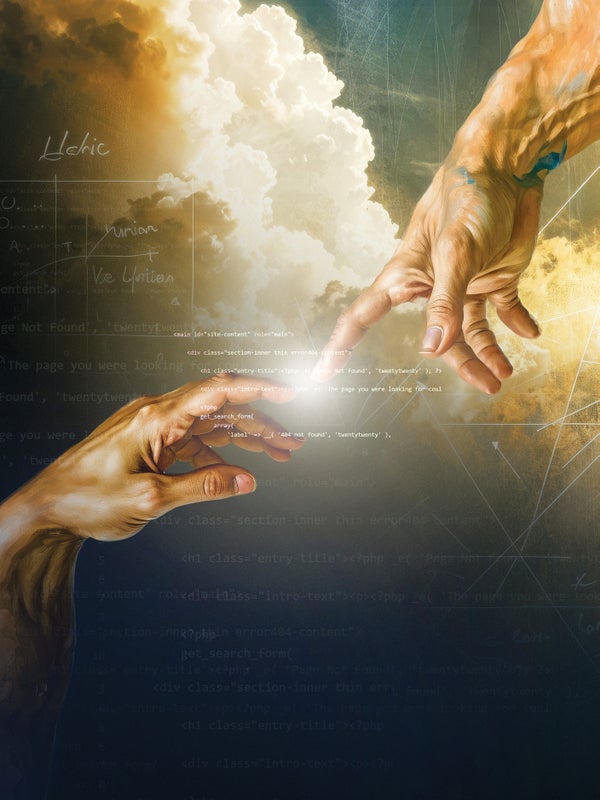Just before midnight on the first day of Ramadan last year, Raihan Khan—a 20-year-old Muslim student living in Kolkata—announced in a LinkedIn post that he had launched QuranGPT, an artificial-intelligence-powered chatbot he had designed to answer questions and provide advice based on Islam’s holiest text. Then he went to sleep. He awoke seven hours later to find it had crashed because of an overflow of traffic. A lot of the comments were positive, but others were not. Some were flat-out threatening.
Khan felt pressure at first to take the chatbot offline, but he ultimately changed his mind. He believes AI can serve as a kind of bridge that connects people with answers to their most profound spiritual questions. “There are people who want to get close to their religion [but] are not willing to spend the time to get to know more about it,” Khan says. “What if I could make it all easily accessible through one prompt?”
QuranGPT—which has now been used by about 230,000 people around the world—is just one of a litany of chatbots trained on religious texts that have recently appeared online. There’s Bible.Ai, Gita GPT, Buddhabot, Apostle Paul AI, a chatbot trained to imitate 16th-century German theologian Martin Luther, another trained on the works of Confucius, and yet another designed to imitate the Delphic oracle. For millennia adherents of various faiths have spent long hours—or entire lifetimes—studying scripture to glean insights into the deepest mysteries of human existence, say, the fate of the soul after death.
On supporting science journalism
If you're enjoying this article, consider supporting our award-winning journalism by subscribing. By purchasing a subscription you are helping to ensure the future of impactful stories about the discoveries and ideas shaping our world today.
The creators of these chatbots don’t necessarily believe large language models (LLMs) will put these age-old theological enigmas to rest. But they do think that with their ability to identify subtle linguistic patterns within vast quantities of text and provide responses to user prompts in humanlike language (a feature called natural-language processing, or NLP), the bots can theoretically synthesize spiritual insights in a matter of seconds, saving users both time and energy. It’s divine wisdom on demand.
Many professional theologians, however, have serious concerns about blending LLMs with religion. Ilia Delio, chair of theology at Villanova University and author of several books about the overlap between religion and science, believes these chatbots—which she describes disparagingly as “shortcuts to God”—undermine the spiritual benefits that have traditionally been achieved through long periods of direct engagement with religious texts. And some secular AI experts think the use of LLMs to interpret scripture is based on a fundamental and potentially dangerous misunderstanding of the technology. Yet religious communities are embracing many types and uses of AI.
One such emerging use case is biblical translation. Before now this work was painstakingly slow; translating ancient sources into the English King James Bible, first published in 1611, took seven years and a host of devoted scholars. But LLMs are expediting the process, enabling scholars to expand the Bible’s reach. A platform called Paratext, for example, uses NLP to translate esoteric terms from scripture—such as “atonement” or “sanctification”—to produce what it describes on its website as “faithful translations of the scriptures.” And last year computer scientists at the University of Southern California launched the Greek Room, a project that aids translation of the Bible into “low-resource” languages (that is, languages for which few, if any, written records exist) through the use of an AI chatbot interface.
LLMs are also being used as a means of studying linguistic variations among translations of the Bible. In a research paper uploaded to the preprint site arXiv.com earlier this year, an international team of scientists described the use of sentiment analysis—an NLP-enabled process for detecting emotional valence in text—to analyze Jesus’ Sermon on the Mount, one of the most well-known passages from the New Testament. (“Blessed are the meek, for they will inherit the earth ...”) After analyzing five different translations of this sermon, including the King James version, the researchers “found that the vocabulary of the respective translations is significantly different” in each case. They also “detected different levels of humor, optimism and empathy in the respective chapters that were used by Jesus to deliver his message.”
AI could help to reinvigorate theology or religious study. Computer scientist Mark Graves believes that LLMs could hypothetically be used to chip away at rigid religious orthodoxy. “In a certain sense, there’s not much that’s been new in theology for, like, 800 years,” says Graves, who is the director of the nonprofit AI and Faith, which wrestles with the ethical challenges of AI. “Generative AI can help with that transition of breaking out of the box ... and creating new ideas.”
For instance, Graves says, imagine one chatbot that’s been trained on the works of Saint Augustine (C.E. 354–430) and another that’s been trained on the works of Thomas Aquinas (circa 1225–1274). Theologians could then have these two noncontemporaries “speak” to each other, possibly leading to fruitful questions about, say, the nature of evil. He compares the stochastic mechanisms behind LLMs to “a novice student or even a young child [asking] a question that prompts a new way of thinking about something.”
Other AI experts, however, are decidedly wary. “There’s going to be a temptation to make money, to make notoriety and to gain attention by ascribing some type of revelatory quality to these chatbots,” says Thomas Arnold, a visiting scholar of technology ethics at Tufts University, who also has a doctorate in religious studies from Harvard University.
Chatbots trained on religious texts “are going to carry some of the same defects that all large language models have at the moment, the biggest of which is hallucinations,” says Noreen Herzfeld, a professor of theology and computer science at Saint John’s University in Minnesota. “They’re going to make stuff up. And if people then believe that what these models are spouting is actually in the Quran or in the New Testament, they could be severely misled.”
Max Marion, a machine-learning engineer who works on fine-tuning the performance of LLMs at AI company MosaicML, worries that Hollywood has already instilled into the public imagination an erroneous picture of AI as infallibly truthful (think of HAL 9000 from Stanley Kubrick’s 2001: A Space Odyssey, for example). But LLMs, he explains, are designed to arrange words in the most statistically logical order; what we call truth doesn’t factor into the equation.
“A chatbot is just a correlation machine,” says Beth Singler, an anthropologist specializing in AI and an assistant professor of digital religions at the University of Zurich. “It takes the corpus [of text], remixes the words and puts them next to each other in terms of their probability of what word follows the next.... That’s not the same as understanding and explaining a doctrine.”
The danger of hallucination in this context is compounded by the fact that religiously oriented chatbots are likely to attract acutely sensitive questions—questions one might feel too embarrassed or ashamed to ask a priest, an imam, a rabbi or even a close friend. During a software update to QuranGPT last year, Khan had a brief glimpse into user prompts, which are usually invisible to him. He recalls seeing that one person had asked, “I caught my wife cheating on me—how should I respond?” Another, more troublingly, had asked, “Can I beat my wife?”
Khan was pleased with the system’s responses (it urged discussion and nonviolence on both counts), but the experience underscored the ethical gravity behind his undertaking. Indeed, other chatbots have responded with deplorable advice. There have been documented cases of Gita GPT condoning murder while citing passages from the Bhagavad Gita. Killing someone, it says, is okay as long as it’s done for the sake of protecting one’s dharma, or duty. For anyone prompting these chatbots for advice, Singler urges people to use a “hermeneutic of suspicion”—a sense of caution born from the fact that words can always be interpreted in many ways, not only by fallible human beings but now also by fallible machines.

